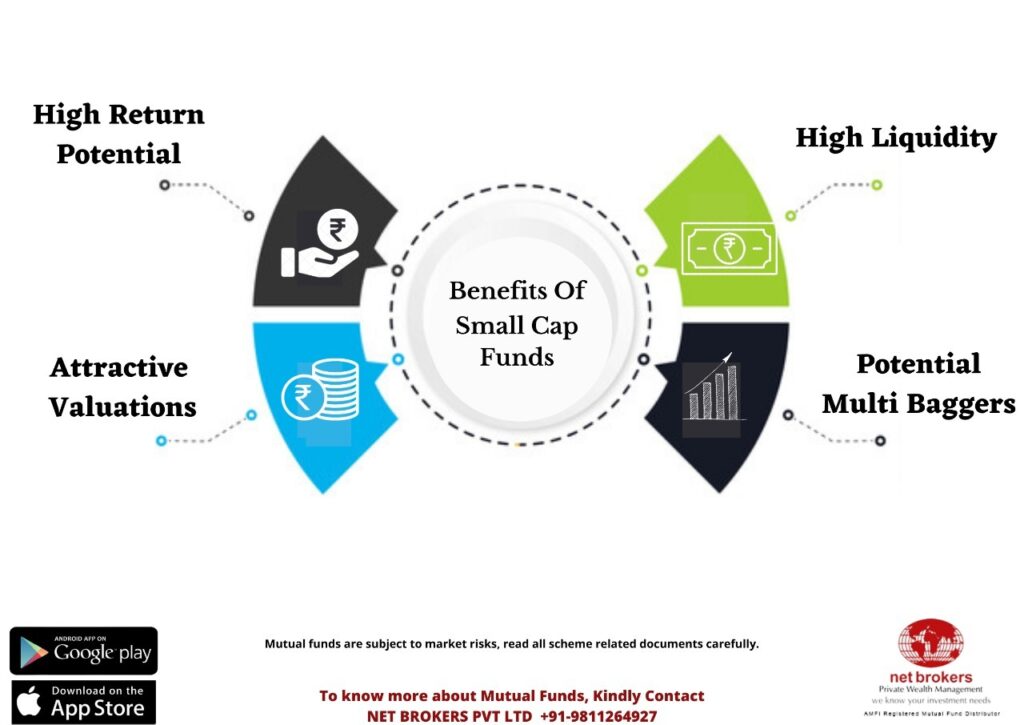Checklist Before Investing in Small Cap Funds
By Akhil Chugh
Date June 5, 2022
Higher returns on investments play a significant role in achieving wealth maximisation in the long term. However, higher returns come with higher risks too. With valuations in the small-cap space now down significantly, Net Brokers believes investors could go for a staggered investment in Small Cap funds to minimise the risk and generate returns in the long run.
In today’s blog, let’s try to understand Small Cap funds in detail and a few things to consider while investing in Small Cap funds.

What are Small Cap Funds?
Small Cap funds are those which invest a major portion of their investible corpus into equity or equity-related instruments of small-cap companies. As per SEBI, small-cap companies need to invest min 65% in small-cap of their total assets in small-cap companies. Small-cap companies are those which are ranked 251 and beyond in terms of market capitalization.
Small Cap funds typically have the highest growth potential since the underlying companies are young and seek to expand aggressively. Quality small caps can be a great investment opportunity in the long run.
These funds promise to capture the growth stories early on by investing in tomorrow’s mid-cap or large-cap companies. Being small has its set of advantages; management is active enough to capitalize on business opportunities during the good times. However, when the tide turns, they are also the most vulnerable and volatile.
Small Cap Funds are ideal for aggressive investors who seek higher returns and are comfortable with high volatility.
Things to Remember While Investing in Small Cap Funds:
1. High Risk-High Return:
Small Cap mutual funds face high market risk. Any changes in the market will reflect a change in the fund’s net asset value (NAV). At a point when the market is bearish, the small-cap fund will in general experience a fall. Amid market volatility, smaller and less-established organizations may also leave the business. Then again, when the market is bullish, the small-cap funds have an incredible capacity to deliver more outstanding returns than other mutual fund types. Small Cap funds are suitable for an investor with high-risk appetite.
2. Investment Horizon:
Patience is the key virtue for successful investing in Small Cap funds. Any impulsive decision can jeopardize your portfolio returns. You need to consider the holistic view of the market condition and make an informed decision. The minimum holding period should be 7 years plus to beat the market volatility & earn returns from Small Cap funds.
3. Fund Manager’s Experience:
Check the fund manager’s past performance record of the various other funds managed by him. Investing in Small Cap funds is extremely challenging – it is about identifying promising companies, taking meaningful stakes well in advance, and holding on to them patiently to make money. Only a very few fund managers have managed to deliver superior reruns over a long period.
4. Fund House Quality:
Don’t invest based on near-term or one-year returns. Instead, look for consistent and stable funds from reputed fund houses with experienced fund managers.
5. Investment Philosophy:
Investors should be comfortable with the investment philosophy of the funds they are looking at and it should be in line with their portfolio objectives. This is of particular importance during periods of increased volatility when investor patience can be severely tested and it will also help them stay invested to truly benefit in the long term.
6. Don’t Over-invest:
Small Cap funds should ideally be only 10-15% of the investor’s overall portfolio. Small-cap -companies do have great potential for growth but they also carry a significantly higher level of risk. Thus, Small Cap funds should not be your core portfolio. Net Brokers suggests taking a calculated exposure to Small Cap funds through the SIP route to harness the potential of small-cap companies to create wealth.
7. Taking the SIP route to invest:
To ensure that investments in small caps don’t get eroded due to the volatility of the stock market, investors can invest in them through SIPs (systematic investment plans). These are regular periodic investments made at periodic intervals to benefit from market volatility and rupee cost averaging in the long run.

Before investing in Small Cap mutual funds, one must keep in mind the amount of risk they can handle, their financial objectives and investment horizon. These are some parameters one should always keep in mind before deciding to invest in the lucrative, but risky Small Cap mutual funds.
Net Brokers believe investing in Small Cap funds can boost investors’ portfolio returns significantly. Invest in Small Cap mutual funds through a systematic investment plan (SIP). It will average out the cost thus decreasing the impact of market volatility.
Our financial experts are always there to guide you on your investing journey. Explore our website & download our Mutual Fund App to find more investment opportunities & start investing!
Happy investing.



